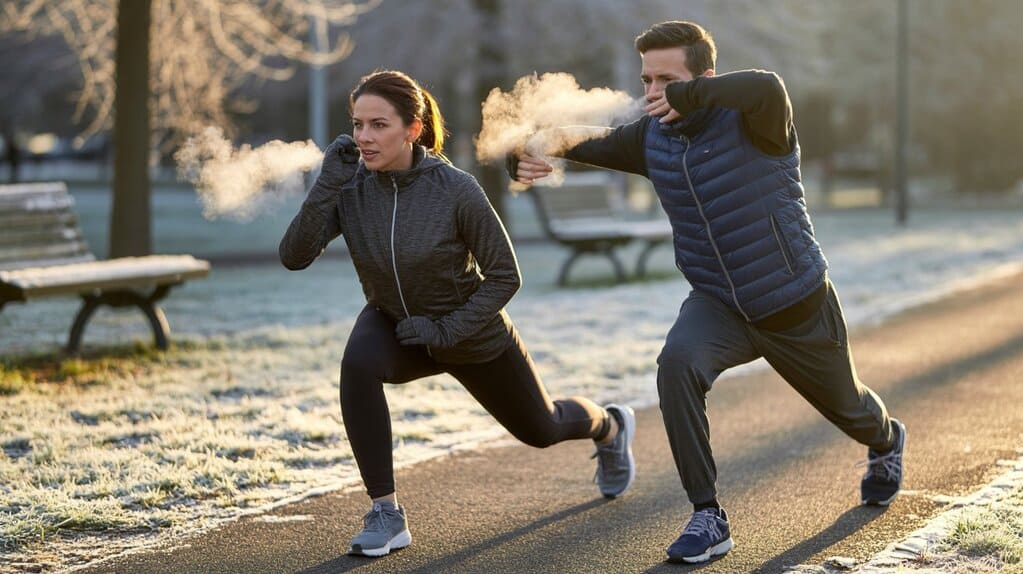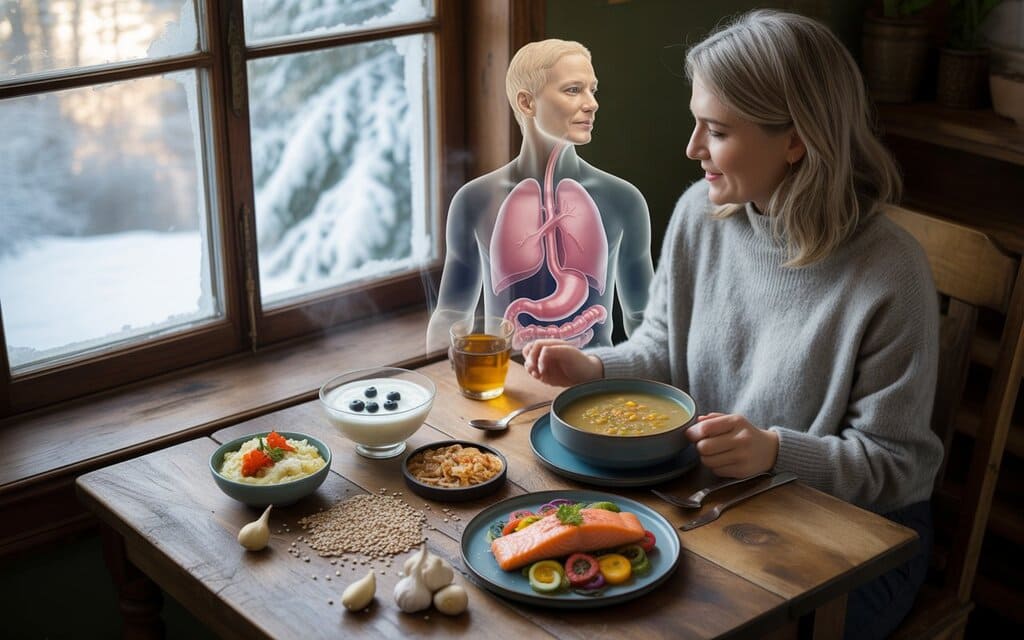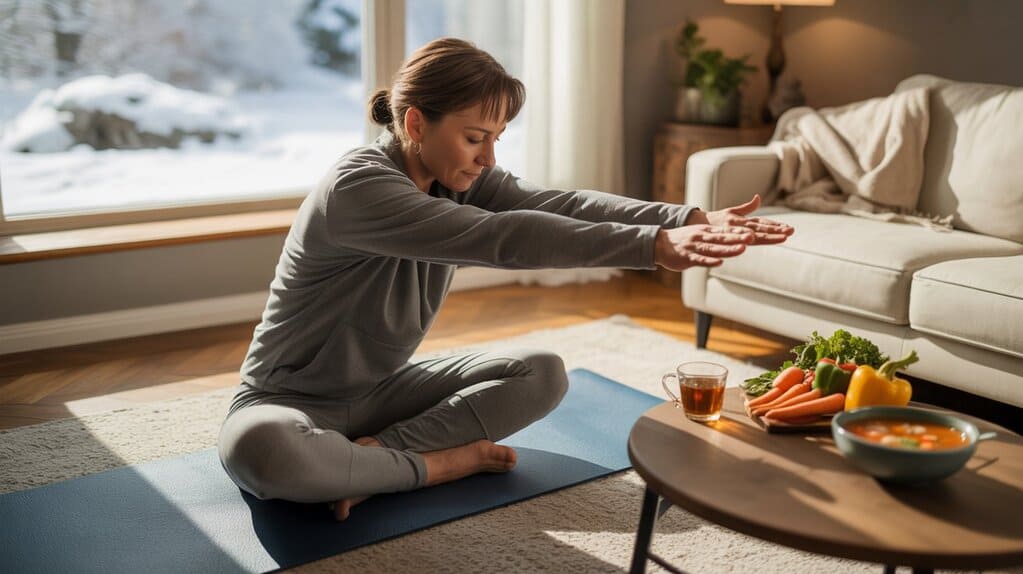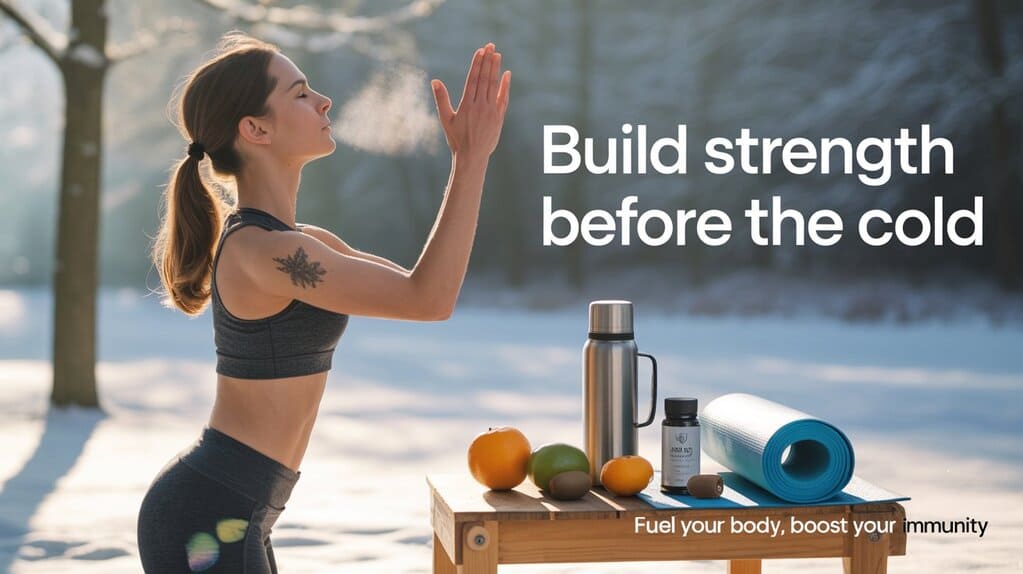
Introduction
As temperatures drop and days grow shorter, preparing your body for winter becomes more than a comfort choice — it’s a health strategy. A focused combination of regular exercise, targeted nutrition, sleep optimization, and smart supplementation reduces your risk of respiratory infections, supports vaccine responses, and helps you maintain energy through the colder months. This article provides an evidence-based fitness routine and nutrition plan you can start today to strengthen immunity, improve resilience to winter colds, and preserve overall health. (See short summary of key recommendations below.) Wikipédia+1
Key Points
- Regular moderate exercise reduces the risk and severity of respiratory infections. PMC+1
- Follow WHO physical activity guidelines: aim for 150–300 minutes of moderate aerobic activity weekly plus muscle-strengthening twice weekly. PubMed
- Nutrition matters: a varied diet rich in vitamins A, C, D, zinc, selenium, protein, and omega-3s supports immune function. Nature+1
- Vitamin D evidence is mixed for respiratory infection prevention — supplementation helps people who are deficient but large trials show variable results. The Lancet+1
- Prioritize sleep, stress management, and hydration — these modulate immune responses and vaccine effectiveness. PubMed
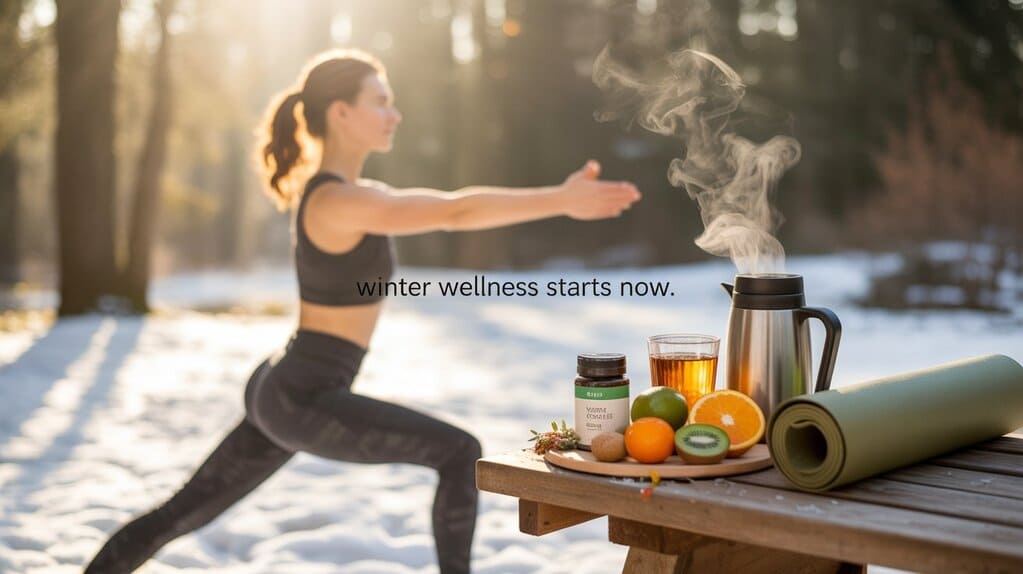
Body
1. How winter affects the body and immunity
Cold weather itself doesn’t directly “give you a cold” — viruses do — but seasonal changes influence exposure and immune function. Shorter daylight lowers vitamin D production; people crowd indoors; and mucosal defenses can change in dry, heated air. The immune system is a coordinated network (innate and adaptive) that defends the body from infection; nutrition, activity, sleep, and stress all modulate its effectiveness. Wikipédia
Practical implication: Preparing for winter means reducing exposure risk (hand hygiene, ventilation), correcting nutritional deficits (vitamin D for many people), and adopting consistent physical activity and sleep routines to keep immune surveillance strong. Nature
2. Exercise: the central pillar of your winter preparation
Why exercise helps. Decades of exercise-immunology research show that regular, moderate-intensity physical activity improves immune surveillance, reduces the risk of community-acquired infections, and lowers respiratory infection mortality in active people (walkers and runners). However, extreme, prolonged high-intensity training without appropriate recovery may transiently suppress some immune functions. Aim for steady, consistent activity rather than sporadic extremes. PMC+1
Weekly training plan (beginner → intermediate):
| Day | Workout (approx. time) | Purpose |
|---|---|---|
| Monday | Brisk walk or light jog (30–40 min) + mobility (10 min) | Aerobic conditioning; circulation & mucosal health |
| Tuesday | Strength training (full-body, 40–50 min) — compound lifts or bodyweight | Maintain muscle, metabolic health, immune-adjuvant effects |
| Wednesday | Active recovery: yoga / stretching (30 min) + short walk (15 min) | Recovery, stress reduction |
| Thursday | Interval cardio (20–30 min, moderate intensity) + core (10 min) | Improve cardiorespiratory fitness |
| Friday | Strength training (40–50 min) | Muscle maintenance; bone health; metabolic resilience |
| Saturday | Outdoor longer aerobic (45–60 min) — hiking/walking/bike | Vitamin D exposure (sun), mood, endurance |
| Sunday | Rest or light mobility | Recovery and sleep consolidation |
Notes:
- Follow WHO guidance: 150–300 minutes of moderate or 75–150 minutes of vigorous activity weekly, plus muscle-strengthening twice per week. PubMed
- If you plan outdoor winter workouts, dress in layers, prioritize core warmth, and avoid freezing wet clothing. Outdoor exposure can be healthy and safe if you adapt clothing and intensity. PMC
Resistance training specifics: 2–3 sets of 6–12 reps for major muscle groups, 45–60 seconds rest, progressive overload across weeks. Strength training supports metabolic health, preserves lean mass, and improves vaccine responses in older adults. PMC
Avoiding overtraining: Watch for excessive fatigue, recurrent infections, or prolonged muscle soreness — signs to back off intensity and improve sleep and nutrition. PMC
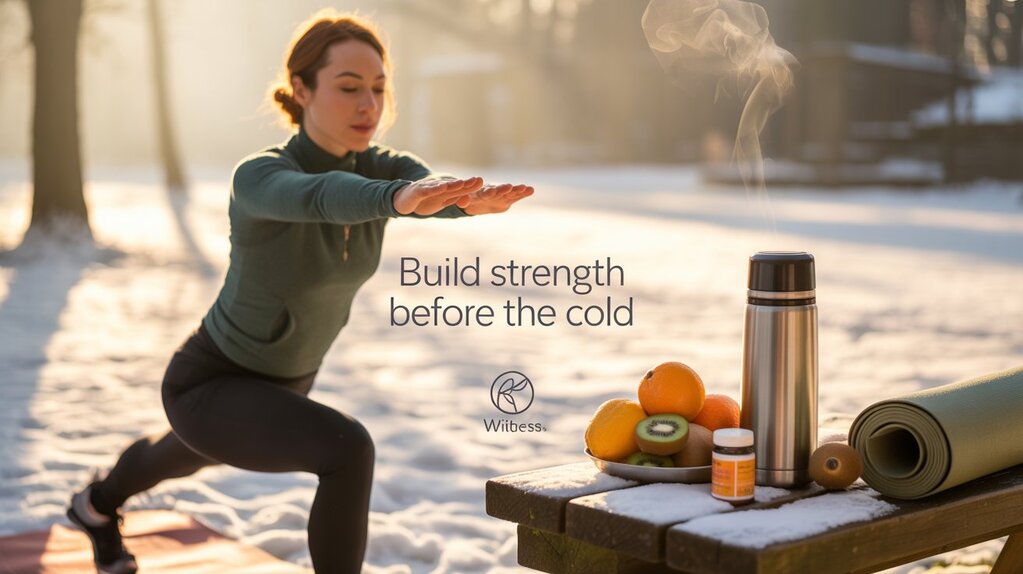
3. Nutrition: what to eat to support immune resilience
A food-first approach is best: a varied diet of whole foods supplies the nutrients your immune system needs. Below is a practical nutrient table for winter immune support.
Table — Key nutrients, food sources, and practical daily targets
| Nutrient | Role for immunity | Food sources | Practical tips |
|---|---|---|---|
| Protein | Builds antibodies, immune cells | Lean meats, fish, legumes, dairy, eggs | Aim for 1.0–1.2 g/kg/day (higher if older or active) |
| Vitamin D | Modulates innate and adaptive immunity | Fatty fish, fortified dairy, sun exposure, supplements | Check levels; supplement if deficient (consult HCP). Evidence on ARI prevention is mixed. The Lancet+1 |
| Vitamin C | Antioxidant; supports epithelial barriers | Citrus, bell peppers, kiwifruit, berries | Aim for diet rich in fruits/veggies; supplements optional |
| Zinc | Important for immune cell function | Oysters, red meat, pumpkin seeds | Avoid long-term excessive supplementation |
| Selenium | Antioxidant cofactor | Brazil nuts (small amount), seafood | One or two Brazil nuts daily can help maintain status |
| Omega-3 (EPA/DHA) | Anti-inflammatory modulation | Fatty fish, algae oil | Beneficial for general health; include fish twice weekly |
| Fiber & polyphenols | Feed microbiome — immune cross-talk | Whole grains, legumes, fruits, vegetables | Diversify plant foods for gut health |
Evidence snapshot: Nutrition shapes immune responses and vaccine effectiveness, particularly in older adults; precision nutrition is an active research area. A 2024 Nature overview emphasizes how diet alters immune cell metabolism and function. Nature+1
Hydration & mucosal health: Dry air dries mucous membranes. Maintain hydration (water intake, humidifier at home if needed) and consider warm broths and soups — they provide fluids and nutrients while easing symptoms if you get sick.
4. Supplements: evidence and cautious use
- Vitamin D: Helpful if deficient; population-level trials have mixed outcomes for respiratory infection prevention (some meta-analyses suggest benefit in deficient individuals; large pragmatic trials show variable results). Get blood levels checked if possible and discuss dosing with a healthcare professional. The Lancet+1
- Vitamin C and zinc: May modestly reduce duration of common cold when started early, but routine high-dose use can have downsides. Use within recommended limits. Nature
- Probiotics: Some strains show small reductions in respiratory infections in certain populations; evidence is strain-specific. Nature
Bottom line: Prioritize whole foods and correct deficiencies rather than blanket high-dose supplements. Always consult a clinician before high-dose or long-term supplementation.
5. Sleep, stress, and recovery
Sleep and stress strongly affect immune outcomes and vaccine responses. Chronic sleep restriction reduces immune function; psychological stress can dysregulate inflammatory responses. Strategies for winter:
- Aim for 7–9 hours nightly (consistent schedule).
- Use sleep-promoting routines: lower evening light, limit caffeine after early afternoon, create a cool, dark bedroom.
- Practice stress-reduction techniques: breathing exercises, short meditations, gratitude journaling, or gentle yoga. These support immune balance and recovery from exercise. PubMed
6. Practical weekly blueprint (sample)
Morning: Light mobility → 20–30 min brisk walk or sun exposure with breakfast (oat porridge + fruit + nuts).
Midday: Strength session (45 min) twice weekly — compound lifts or circuit bodyweight + protein-rich lunch (fish/legumes + salad).
Evening: Wind-down 60–90 min before bed; light stretching; warm soup on cold nights. Prioritize 7–9 hours sleep.
Conclusion
Preparing for the coming winter cold is a multifactorial process: consistent moderate exercise, balanced nutrition, sleep and stress control, and targeted correction of deficiencies (notably vitamin D when deficient) give you the best odds of staying healthy and resilient. Follow WHO activity recommendations, prioritize whole foods rich in protein, vitamins, and minerals, and keep training steady rather than extreme. If you’re older, immunocompromised, or have chronic conditions, tailor plans with your healthcare provider — nutrition and exercise strategies can and should be individualized. The science supports a sensible, consistent lifestyle approach: stay active, eat well, sleep enough, and use supplements only when needed. PubMed+2PMC+2
Practical SEO-friendly bold keywords used in this article
winter fitness plan, boost immunity for winter, nutrition for cold season, winter workout routine, foods to prevent colds, vitamin D for immunity, strength training winter, cardio for immune health, sleep and immunity, prevent respiratory infections.
Short list of recent scientific and medical studies and sources (selected)
- Nieman DC, Wentz LM. Physical activity and the risk for acute respiratory infections; exercise immunology. (Review and analyses showing lower risk with regular activity). PMC+1
- Chastin SFM et al. Effects of Regular Physical Activity on the Immune System and Infectious Disease Outcomes (Systematic evidence linking moderate exercise to lower infectious disease risk). PubMed
- Jolliffe DA et al. Vitamin D supplementation and acute respiratory infection trials and meta-analyses; CORONAVIT and related work. (Mixed outcomes: benefit in deficient individuals; heterogeneous trial results). The Lancet+1
- Nature (2024) — Nic Fleming, Your diet can change your immune system — here’s how. (Overview on diet–immune interactions). Nature
- Volkert D. Nutrition for the older adult — current concepts (Review on ageing, nutrition, and immune function). ScienceDirect
- WHO Guidelines on Physical Activity and Sedentary Behaviour (2020) — global activity recommendations. PubMed
- Practicing Sport in Cold Environments (2021) — guidance on exercising safely in cold conditions. PMC
Full references and useful links
- Nieman DC, Physical activity lowers the risk for acute respiratory infections. PMC article. PMC
- Nieman DC, Exercise immunology: Novel insights. PMC review (2024). PMC
- Chastin SFM et al., Effects of Regular Physical Activity on the Immune System (2021). PubMed
- Jolliffe DA et al., Vitamin D and acute respiratory infections (Lancet / BMJ trials and meta-analyses). The Lancet+1
- Nature — Nic Fleming, Your diet can change your immune system — here’s how. (Oct 2024). Nature
- Volkert D., Nutrition for the older adult – Current concepts. (2024). ScienceDirect
- WHO, Guidelines on physical activity and sedentary behaviour (2020). PubMed
- Gatterer H., Practicing Sport in Cold Environments (2021). PMC
- Wikipedia, Immune system (general overview). Wikipédia

